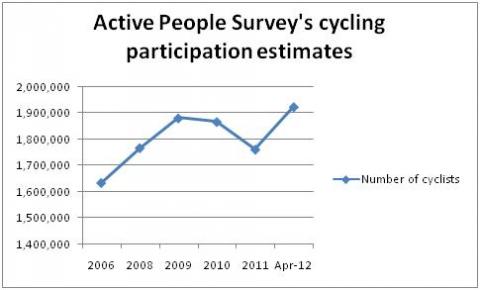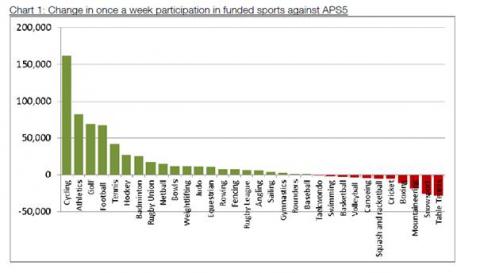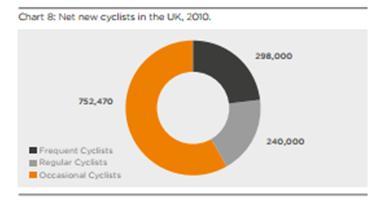Have 500,000 people taken up cycling as a result of the 2008 Olympics?
"British Cycling will tell you that there are an extra half a million people cycling since Beijing."
Hugh Robertson, Minister for Sport and the Olympics, 26 June 2012
"Claiming that there was a "clear and demonstrable" link between elite sport success and encouraging sport at the grass roots, [Mr Robertson] said 500,000 extra cyclists had taken to the road or the track since Britain's unprecedented success in Beijing."
The Guardian, 23 June 2012
As the start of the Olympics runs, jumps and hurdles ever closer, recent publicity around a Lancet report on the dangerous inactivity of UK adults suggests that two thirds of us would prefer to leave sport to the professionals and watch them sweat from the comfort of our sofas.
Within this context, the Sports Minister spoke before the Select Committee on Science and Technology on Tuesday about the potential long-term benefits the upcoming Olympics could have on the nation's health.
Citing the legacy of Team GB's successful cycling performance at Beijing, Mr Robertson pointed to the extra half million who have put hands to handlebars and feet to pedals across the UK. Not only this, but he clarifies that these 500,000 are not simply champagne cyclists, but regularly go on at least one 30 minute cycle ride every week.
But is this wheelie correct? And can we demonstrate a clear link between Team GB's cycling success and the number of Britons taking the bike out regularly?
Analysis
As Mr Robertson specifically cites British Cycling, the national governing body for cycle sport in the UK, Full Fact contacted their press office to ask after any information they might have on cycling participation in the UK.
British Cycling couldn't pinpoint the precise root of Mr Robertson's claim straightaway, but said any figures they cite on the number of new cyclists (specifically 'new cyclists cycling for at least one 30-minute session per week') would be sourced from one of two surveys: Sport England's Active People Survey or an LSE study commissioned by British Cycling and Sky in 2011.
So do either of these back up Mr Robertson's claim?
The Active People Survey
The Active People Survey (APS) is an annual survey conducted on behalf of the Government by Sport England and, amongst other things, measures the proportion of adults involved in sport on a weekly basis.
The latest rolling 12 month results for the period April 2011 and April 2012 were released on Sunday, and, as British Cycling has correctly highlighted these figures show that there has been an increase of 161,300 cyclists between April 2012 and October 2011.
So much for recent improvements, but what about the change in cycling participation rates since Beijing?
The survey results from October 2008 offer the closest proxy for the baseline at the time of the last Olympic Games, and the table below from the report shows that the number of cyclists has increased by 155,400 between then and April 2012.

This is clearly a long way from Mr Robertson's figure of 500,000.
One possible reason for Mr Robertson's missing 344,400 new cyclists could be that the APS figures only include cyclists who take their weekly cycle ride for health, recreation, training or competitive purposes, and not to simply travel from one place to the next.
We've been in touch with the Sports Minister's team to try to clarify this, but so far without success.
To add to the loose ends, the APS does not question the adults in their sample on their motivations for taking up the sport. So from this report alone, we cannot glean whether the increase in cyclists in the UK since 2008 is in anyway down to the success in Beijing.
What we can see from previous surveys is that the increase since the last Olympics hasn't been a smooth ride:

After a dip in participation between 2009 and 2011, the rise since then has actually outstripped any other since 2008. If the Beijing Olympics are behind this increase therefore, the stimulus has had a delayed (or perhaps prolonged) effect.
However, despite these ups and downs, the recent survey also shows that, compared to other sports measured by the APS, cycling has by far enjoyed the biggest swell in numbers between October 2008 and April 2012, above both athletics and football:

So although the Active People Survey backs the thrust of the Minister's claim about the relative success of cycling in attracting new participants, the numbers themselves don't seem to quite add up.
The LSE Study
So can we get any closer to the elusive half million by considering the LSE study commissioned by British Cycling and Sky: British Cycling Economy: "Gross Cycling Product" Report, published in August 2011?
The report's main aim is to establish the extent of cycling's contribution to the British economy, based on cycling statistics from 2010. This includes calculating the number of new cyclists within that year.
The report states that there was a "net addition of 1.3m new cyclists in 2010 of whom 500,000 are Frequent or Regular Cyclists."
This certainly seems like the smoking gun in the hunt for Mr Robertson's figures. However, the breakdown of this estimate shown in the chart below pours cold water on this:

The working definition of a "Regular Cyclist" is someone who cycles 12 or more times a year, whereas a "Frequent Cyclist" will cycle once a week or more. Taking this into account, the findings of the LSE report is that, in 2010, there were 298,000 new cyclists who cycle at least once a week.
While this clocks in well below the half million mark, we need to remember that this only applies to 2010. As a one-off study, the LSE research can't fill in the blanks left for the other years since the Beijing games, but if similar numbers embraced the lycra in these years then we could expect to comfortably breach the 500,000 threshold.
What the LSE report does talk about is what it calls "the Olympic and Paralympic Legacy Effect". Although it doesn't go so far as to attribute the entire increase in cyclists to this "Legacy Effect", it does mention a hope that hosting the Games should boost cycling in the UK, as long as the UK "plans and drives forward legacy ambitions".
It also cites a claim from British Cycling that evidence from Sydney noted that cycling was the most popular sport to take up after the city hosted the 2000 Olympic and Paralympic Games, however the source of this claim isn't clear.
Conclusion
Neither of the two sources pointed to by British Cycling entirely supports Mr Robertson's claim that an extra half a million people have taken to the saddle at least once a week since the 2008 Beijing Olympics.
The LSE has found that 500,000 people took up cycling on a regular or frequent basis in 2010, which may be the statistic that the Sports Minister is alluding to.
If this is the case, then it is important to point out that this includes people cycling on a monthly rather than weekly basis, and applies to 2010 in isolation rather than the entire period since the last Games in China.
That said, it is certainly plausible that half a million more people use their bikes at least once a week since Beijing: LSE noted a 298,000 rise in 2010 alone, which if repeated in the other three years would account for more than an extra million cyclists on Britain's roads. However based on this research alone it isn't possible to say that this is a solid fact.
We've been in touch with Mr Robertson's office to see if they can provide any more information that might shed light on his figure, and will update if we learn more. Follow us on Twitter or Facebook to stay in touch.